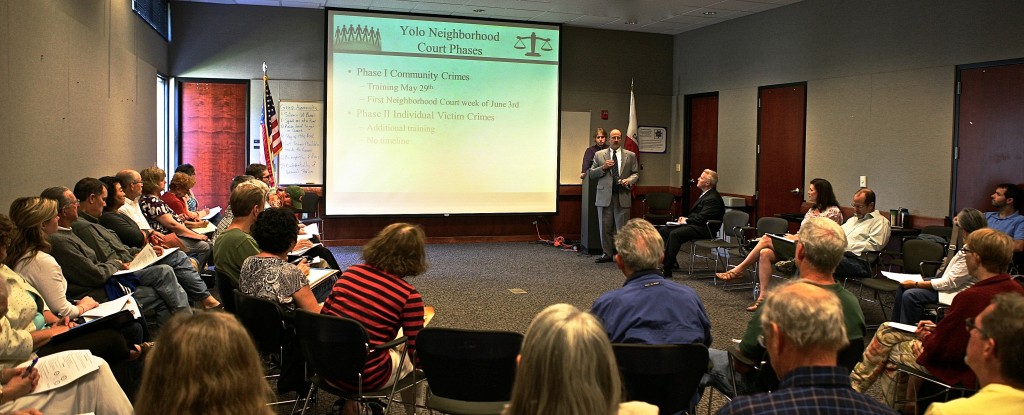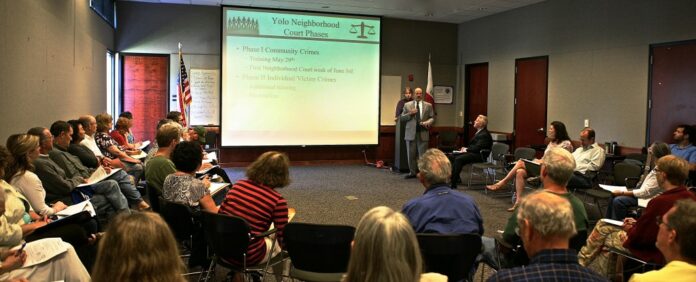Grant to expand program to Woodlands, West Sacramento over the next three years
 On Feb. 12 The Yolo County District Attorney (DA) Office received a $1.95 million grant to expand the Neighborhood Court Program to neighboring cities Woodland and West Sacramento. The grant, called the Edward Byrne Memorial Justice Assistance Grants, will be awarded throughout a three-year period.
On Feb. 12 The Yolo County District Attorney (DA) Office received a $1.95 million grant to expand the Neighborhood Court Program to neighboring cities Woodland and West Sacramento. The grant, called the Edward Byrne Memorial Justice Assistance Grants, will be awarded throughout a three-year period.
“The grant will be used to expand the program into the cities of West Sacramento and Woodland, basically taking the model that has been worked at UC Davis and the city of Davis…the money will be used in the cities to build the infrastructure [of the program],” said Jeff Reisig, Yolo County DA.
According to Yolo County DA Chris Bulkeley, the majority of offenders that would go through the program in West Sacramento are related to theft. He says the resources provided to students at UC Davis are very helpful in addressing issues.
“In [West Sacramento] you have [people] that have fewer menu of options and facilities, and other people that are on disability insurances, food stamps, and maybe have mental health issues, and they are stealing food for basic necessities. There are a number of individuals we encountered of that category,” Bulkeley said.
According to Bulkeley, the Neighborhood Court Program is a “victim-centric” handling of crimes. The DA office decides on reports that come from the police department if it is appropriate for the Neighborhood Court Program. Cases handled through the program will not have public records such as court cases, emphasizing on the restorative justice nature, of the program. The victim’s approval is also essential in the decision to handle the case through the Neighborhood Court Program, emphasizing on the victim-centric focus of the program.
“Neighborhood court is an alternative for the criminal court and it is based on the concept of restorative justice. Our model in Yolo County entails a collaborative restorative justice process involving the community,” Reisig said.
One of the main differences between the criminal court and the Neighborhood Court Program is that with neighborhood court, the defendant and the victim(s) can collaborate to find a solution.
“We bring those parties together, work through in a conversation what the harm was, how it affects the community and victim, how the offender can restore the victim and community and how we make sure it doesn’t happen again,” Reisig said.
The program also entails that solutions are tailored to the individual, even if two individuals committed a crime together. According to Bulkeley, in
one case, a retail theft offender who went through the neighborhood court program had to write an essay on the impact of theft to the retail business
and complete the CFI Goal Directed Behavior workbook in order to remedy their negative impact on the community. While another offender, involved in the same crime, agreed to research and present a list of services accessible by foster children as this particular offender was a former foster child.
“The system is designed so that whatever the agreement is [at] the end of the panel is designed to bring them back into the community,” said Johnathan Baldauf, a third-year law student at UC Davis.
The neighborhood court program for adult criminal offenders was first founded in San Francisco. According to Reisig, the program had several modifications to be adaptive to the Davis community, as well as to fully utilize the availability of skilled and experienced volunteers in the restorative justice process.
“[We ensure] that there [is] an actual conversation between the victim, the offender and the community in every case possible. [Neighborhood Court isn’t] just [telling] an offender … ‘don’t do that again’. [They are told] ‘here’s what you need to do to make it right’,” Reisig said.
According to Bulkeley, the program in Davis has had over 400 participants since its inception in 2013. The program handled 338 cases in 2014, largely handling cases related to alcohol-related offenses, including open container alcohol, public urination, public Identification Card crimes and furnishing alcohol for minors according to a press release.
“Davis is unique in this region where the restaurants are concentrated in an area and they turn into nightclubs. They attract people from all over the place who are looking to party,” said Bulkeley.
The Neighborhood Court Program is in collaboration with the Davis Police Department, UC Davis and the City of Davis. However, it also requires community volunteers to be directly involved in the cases. Community volunteers are all trained on restorative justice. In UC Davis and the city of Davis, faculties and students are among the 100 volunteers of this program. Volunteers are trained to be either panelists or facilitators. According to the DA website, panelists represents the “community’s needs, interests, and perspectives with respect to the crime committed”. According to Bulkeley, the facilitators are volunteers with additional training who act as “mediator” and guide the restorative dialogue/agreement process in the conferences.
“This is an interesting way to not only work in the DA’s office but also to give back to the community in a restorative take on justice,” said Baldauf.
Photo courtesy of the Yolo County District Attorney Office.




